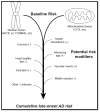Is Alzheimer's disease a systemic disease? - PubMed (original) (raw)
Review
Is Alzheimer's disease a systemic disease?
Jill K Morris et al. Biochim Biophys Acta. 2014 Sep.
Abstract
Although Alzheimer's disease (AD) is the most common neurodegenerative disease, the etiology of AD is not well understood. In some cases, genetic factors explain AD risk, but a high percentage of late-onset AD is unexplained. The fact that AD is associated with a number of physical and systemic manifestations suggests that AD is a multifactorial disease that affects both the CNS and periphery. Interestingly, a common feature of many systemic processes linked to AD is involvement in energy metabolism. The goals of this review are to 1) explore the evidence that peripheral processes contribute to AD risk, 2) explore ways that AD modulates whole-body changes, and 3) discuss the role of genetics, mitochondria, and vascular mechanisms as underlying factors that could mediate both central and peripheral manifestations of AD. Despite efforts to strictly define AD as a homogeneous CNS disease, there may be no single etiologic pathway leading to the syndrome of AD dementia. Rather, the neurodegenerative process may involve some degree of baseline genetic risk that is modified by external risk factors. Continued research into the diverse but related processes linked to AD risk is necessary for successful development of disease-modifying therapies.
Keywords: Alzheimer's disease; Exercise; Metabolism; Mitochondria; Physical activity.
Copyright © 2014 Elsevier B.V. All rights reserved.
Figures
Figure 1. Schematic of potential risk factors for AD
We propose that a combination of nuclear and mitochondrially-encoded genes determine one’s baseline risk for AD. This baseline risk can be modified – either increased (+) or decreased (−) by a wide variety of environmental factors, (diet, exercise) socioeconomic factors (i.e. education) and inevitably by the aging process.
Similar articles
- Alzheimer's Disease Puzzle: Delving into Pathogenesis Hypotheses.
Nasb M, Tao W, Chen N. Nasb M, et al. Aging Dis. 2024 Feb 1;15(1):43-73. doi: 10.14336/AD.2023.0608. Aging Dis. 2024. PMID: 37450931 Free PMC article. Review. - Neurovascular dysfunction, inflammation and endothelial activation: implications for the pathogenesis of Alzheimer's disease.
Grammas P. Grammas P. J Neuroinflammation. 2011 Mar 25;8:26. doi: 10.1186/1742-2094-8-26. J Neuroinflammation. 2011. PMID: 21439035 Free PMC article. Review. - Redox regulation of heat shock protein expression in aging and neurodegenerative disorders associated with oxidative stress: a nutritional approach.
Calabrese V, Scapagnini G, Colombrita C, Ravagna A, Pennisi G, Giuffrida Stella AM, Galli F, Butterfield DA. Calabrese V, et al. Amino Acids. 2003 Dec;25(3-4):437-44. doi: 10.1007/s00726-003-0048-2. Epub 2003 Nov 7. Amino Acids. 2003. PMID: 14661103 Review. - Risk factors for age at onset of dementia due to Alzheimer's disease in a sample of patients with low mean schooling from São Paulo, Brazil.
de Oliveira FF, Bertolucci PH, Chen ES, Smith MC. de Oliveira FF, et al. Int J Geriatr Psychiatry. 2014 Oct;29(10):1033-9. doi: 10.1002/gps.4094. Epub 2014 Mar 4. Int J Geriatr Psychiatry. 2014. PMID: 24596166 - [Genetics of late-onset Alzheimer's disease: vascular risk and beta-amyloid metabolism].
Panza F, Solfrizzi V, D'Introno A, Capurso C, Colacicco AM, Torres F, Altomare E, Capurso A. Panza F, et al. Recenti Prog Med. 2002 Sep;93(9):489-97. Recenti Prog Med. 2002. PMID: 12355988 Review. Italian.
Cited by
- Amyloid precursor protein and mitochondria.
Strope TA, Wilkins HM. Strope TA, et al. Curr Opin Neurobiol. 2023 Feb;78:102651. doi: 10.1016/j.conb.2022.102651. Epub 2022 Nov 30. Curr Opin Neurobiol. 2023. PMID: 36462447 Free PMC article. Review. - Exercise Training-Increased FBXO32 and FOXO1 in a Gender-Dependent Manner in Mild Cognitively Impaired African Americans: GEMS-1 Study.
Bedada FB, Ntekim OE, Nwulia EO, Fungwe TV, Nadarajah SR, Obisesan TO. Bedada FB, et al. Front Aging Neurosci. 2021 Apr 14;13:641758. doi: 10.3389/fnagi.2021.641758. eCollection 2021. Front Aging Neurosci. 2021. PMID: 33935685 Free PMC article. - Ghrelin system in Alzheimer's disease.
Tian J, Wang T, Du H. Tian J, et al. Curr Opin Neurobiol. 2023 Feb;78:102655. doi: 10.1016/j.conb.2022.102655. Epub 2022 Dec 15. Curr Opin Neurobiol. 2023. PMID: 36527939 Free PMC article. Review. - Dietary Neuroketotherapeutics for Alzheimer's Disease: An Evidence Update and the Potential Role for Diet Quality.
Taylor MK, Swerdlow RH, Sullivan DK. Taylor MK, et al. Nutrients. 2019 Aug 15;11(8):1910. doi: 10.3390/nu11081910. Nutrients. 2019. PMID: 31443216 Free PMC article. Review. - Sex Differences in Innate Immune Response of Peripheral Blood Leukocytes of Alzheimer's Disease Patients.
Sochocka M, Ochnik M, Sobczyński M, Orzechowska B, Leszek J. Sochocka M, et al. Arch Immunol Ther Exp (Warsz). 2022 Jun 16;70(1):16. doi: 10.1007/s00005-022-00653-w. Arch Immunol Ther Exp (Warsz). 2022. PMID: 35708851
References
- Thies W, Bleiler L, Alzheimer’s A. 2013 Alzheimer’s disease facts and figures. Alzheimers Dement. 2013;9(2):208–45. - PubMed
- Agosta F, Pievani M, Sala S, et al. White matter damage in Alzheimer disease and its relationship to gray matter atrophy. Radiology. 2011;258(3):853–63. - PubMed
- Backman L, Jones S, Berger AK, et al. Multiple cognitive deficits during the transition to Alzheimer’s disease. J Intern Med. 2004;256(3):195–204. - PubMed
- Riviere S, Gillette-Guyonnet S, Andrieu S, et al. Cognitive function and caregiver burden: predictive factors for eating behaviour disorders in Alzheimer’s disease. Int J Geriatr Psychiatry. 2002;17(10):950–5. - PubMed
- Johnson DK, Wilkins CH, Morris JC. Accelerated Weight Loss May Precede Diagnosis in Alzheimer Disease. Arch Neurol. 2006;63(9):1312–1317. - PubMed
Publication types
MeSH terms
Grants and funding
- R01 AG043962/AG/NIA NIH HHS/United States
- F32AG044953/AG/NIA NIH HHS/United States
- P30 AG035982/AG/NIA NIH HHS/United States
- R01AG033673/AG/NIA NIH HHS/United States
- R01AG034614/AG/NIA NIH HHS/United States
- KL2 TR000119/TR/NCATS NIH HHS/United States
- F32 AG044953/AG/NIA NIH HHS/United States
- R01 AG033673/AG/NIA NIH HHS/United States
- K01 AG035042/AG/NIA NIH HHS/United States
- K01AG035042/AG/NIA NIH HHS/United States
- UL1 TR000001/TR/NCATS NIH HHS/United States
- R01AG043962/AG/NIA NIH HHS/United States
- P30AG035982/AG/NIA NIH HHS/United States
LinkOut - more resources
Full Text Sources
Other Literature Sources
Medical
